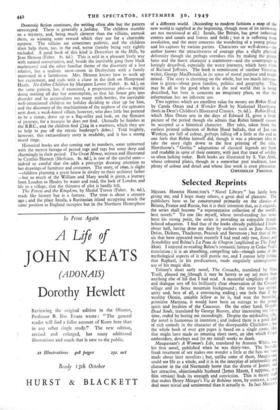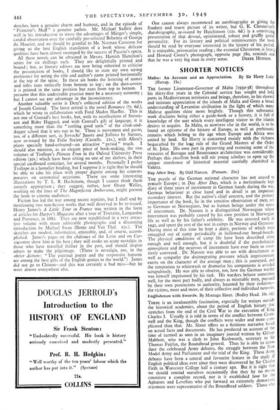Selected Reprints
MESSRS. HAMISH HAMILTON'S " Novel Library " has lately been giving me, and I hope many others, a great deal of pleasure. The publishers have so far concentrated primarily on the classics of Britain, France and Russia, but it is their intention that, as it expand,, the series shall become "a representative collection of the world') best novels." To one like myself, whose novel-reading has never been his strong point, the series is providing an enjoyable though belated education. I find that of the books already published I knew about half, having done my duty by authors such as Jane Austen, Defoe, Dickens, Thackeray, Peacock and Stevenson ; but that of the six that have appeared most recently I had read only two, Sense and Sensibility and Balzac's La Peau de Chagrin (anglicised as The Fatal Skin). I enjoyed re-reading Balzac's romantic fantasy in Cedar Paul's translation ; it is an absorbing, compelling tale—though some of the mythological aspects of it still puzzle me, and I cannot help feeling that Raphael, in his predicament, made singularly unimaginative use of his magic skin.
Tolstoy's short early novel, The Cossacks, translated by Vera Trail!, pleased me (though it may be heresy to say so) more than anything else of hie that I had read. A masterful simplicity of style and dialogue sets off his brilliantly dear observation of the Cossack village and its fierce mountain background ; the story has artistic unity and, best of all, a convincing ending ; one feels that if the wealthy Olenin, amiable fellow as he is, had won the beautiful, primitive Maryana, it would have been an outrage to the proud spirit and loyalties of the Caucasus. On the other hand, Gogol', Dead Souls, translated by George Reavey, after interesting me tor a time, ended by boring me exceedingly. Despite the misleading title, the novel is humorous in intention ; and indeed there is a good deal of rich comedy in the character of the disreputable Chichikov ; but the whole book of over 45o pages is based on a single comic idea that might have made an amusing short story, an idea which C. WI embroiders, develops and (to my mind) works to death. Maupassant's A Woman's Life, translated by Antonia White, SVii his first novel, published when he was thirty-two. The brutally frank treatment of sex makes one wonder a little at the fuss we 'lave made about later novelists ; but, unlike some of them, Maupa,sant could see life as a whole, and it is in the interplay of relationship and character in the old Normandy home that the drama of Jeanne and her attractive, objectionable husband (James Mason, I suPPosc, film version) finds its strength and conviction. This is meaty ;tuff that makes Henry Miirger's Vie de Boheme seem, by contrast, a deal more trivial and sentimental than it actually is. In fact Miirget
sketches have a genuine charm and humour, and in the episode of " Francine's Muff " a genuine pathos. Mr. Michael Sadleir does well in his introduction to stress the advantages of Miirger's simple, candid observation over the carefully pre-selected Bohemia of George du Maurier, and we should be grateful to Mr. Norman Cameron for giving us the best English translation of a book whose delicate qualities have been almost swamped by the success of Puccini's opera.
All these novels can be obtained in Messrs. Hamish Hamilton's series for six shillings each. They are delightfully printed and bound ; but, as literary editors arc now being exhorted to criticise the presentation of books, I should like to state my own strong preference for seeing the title and author's name printed horizontally at the top of the spine. In these six books the lettering of names and titles runs vertically from bottom to top ; on the dust-covers it is printed in the same position but runs from top to bottom. I presume that this undesirable practice must be a necessary economy ; but I cannot see any advantage in the inconsistency.
Another valuable series is Dent's collected edition of the works of Joseph Conrad. The latest arrival is the novel Romance (7s. 6d.), which he wrote in collaboration with Ford Madox Hueffer. This is not one of Conrad's best books, but, with its recollections of Steven- son and Rider Haggard, and with Conrad's gift of language, it is something more than the "rattling good yarn" of the cloak-and- dagger school that it sets out to be. There is movement and gusto, too, of a different sort, in Jorrocks' jaunts and jollities by Surtees, now re-issued by the Folio Society (Cassells. 21s.), with Alken's plates specially hand-coloured—an attractive " period " touch. I should also mention, as an elegant piece of book-making, the two volumes of Trollope's Plsineas Finn in the Oxford University Press edition (3os.) which have been sitting on one of my shelves, in their special cardboard container, for several months. Personally I prefer Trollope in a homelier binding, but I suppose it is right that he should be able to take his place with proper dignity among his contem- poraries on ceremonial occasions. There arc some interesting illustrations by T. L. B. Huskinson, though I cannot think them entirely appropriate ; they suggest, rather, how Orson Welles, working on the lines of The Magnificent Ambersons, might present the book to cinema audiences.
Fiction has led the way among recent reprints, but I shall end by mentioning two non-fiction works that well deserved to be re-issued. Henry James's A Little Tour in France was written in the form of articles for Harper's Magazine after a -tour of Touraine, Languedoc and Provence, in 1882. They are now republished in a very attrac- tive volume with many admirable photographs and a discerning introduction by Michael Swan (Home and Van Thal. 155.). The sketches are modest, informative, enjoyable, and, of course, accom- plished. James's pages on the chateaux of the Loire and on Car- cassonne show him at his best ; they will evoke an acute nostalgia in those who have travelled thither in the past, and should inspire others to make the pilgrimage. (There is nostalgia, too, in the obirer dictum: " The paternal porter and the responsive hansom are among the best gifts of the English genius to the world.") James did not go to Chinon—and this was certainly a bad miss—but he went almost everywhere else.
One cannot always recommend an autobiography as giving th, frankest and truest picture of its writer, but G. K. Chesterton'i Autobiography, re-issued by Hutchinson (12s. 6d.) is a convincing presentation of that devout, opinionated, robust and gruffly genial personality. For its literary and political reminiscences the book should be read by everyone interested in the history of his period. It is enjoyable, provocative reading ; the essential Chesterton is here; and Howard Coster's photograph, opposite page 28o, reminds one that he was a very big man in every sense. DEREK HUDSON.















































 Previous page
Previous page